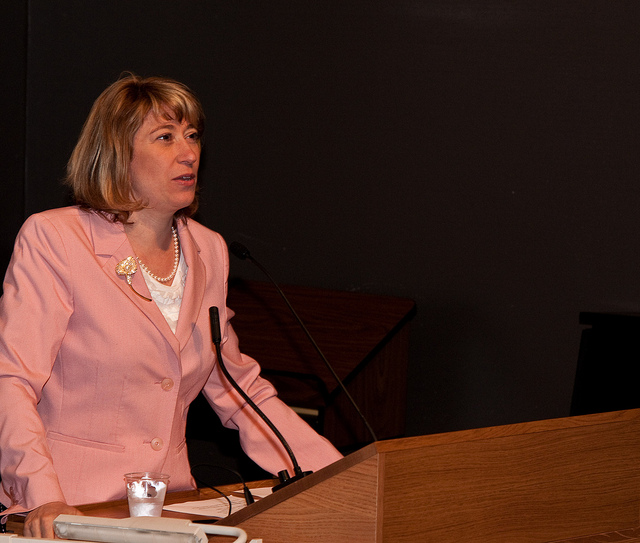Another big report, another display of our witlessly shallow politics, which this time has outdone itself almost to the point of comedy in its haste to pour sulphur on the head of Laurel Broten and her tax and regulatory review.
Tory Leader Jamie Baillie comes up with the ultimate neo-con cliché (“job-killing carbon tax”) and sees nothing but “major tax increases” and a retro attempt to “tax our way to prosperity.”
Alternatively, NDP Leader Maureen MacDonald and the left generally see only tax cuts for the rich and dumping on the little people. “Taking the HST off home heat? C’mon, that’s not the way to go,” she snapped. Never mind that three-quarters or more of these budget-busting subsidies go to those of us perfectly capable of paying — ignoring better ways to help the needy.
Most public comment bristles with that “yeah, right” hissing tone.
But the eyeball-popper was Premier Stephen McNeil saying that taking the tax subsidy off household essentials would require a referendum.
What? Is this some obscure law? A policy statement? A personal opinion? Either way, it sounds like “No, no, no, we’re petrified and we’re trying to wiggle out of it.”
Here’s my advice for all of the above: READ THE DAMN REPORT.
In doing so, keep in mind that this is mostly a 10-year plan of gradual change — admittedly a challenge when the political viewplane is barely a couple of days beyond the evening news. (In 10 years, carbon taxes, mostly revenue-neutral, will be universal — even the oil companies are resigned to that).
The main rap against the report is about tax cuts to the rich while HST exemptions come off home heat, baby diapers, books, etc. So let’s look at what she proposes to compensate.
She wants to raise the basic personal exemption to $11,000 (from $8,000) — which would be among the highest in Canada. She wants to jack up the deduction for dependents and expand the Nova Scotia child benefit.
Plus this: she wants the Department of Community Services to work with Finance to “redesign an income support system that interacts with the tax system” to offer incentives for people to join the workforce rather than penalizing them if they do.
She has OECD studies indicating that discouraging welfare recipients and other low-income earners from working actually drags back economic activity. She also wants Nova Scotians to “have a conversation” about a guaranteed annual income, for which the simplified tax system she proposes would be a prerequisite.
What’s wrong with all that?
As for the corporate tax cuts, she says we’re actually losing revenue because our rate is the highest in Canada.
Through the magic of financial planning, multi-provincial companies arrange to pay taxes where they’re lowest. By dropping our corporate rate to the Canadian average, she claims, we would actually increase our revenue from the tax.
Yes, it’s aggravating that overpaid CEOs and companies can skip off like that, but if it’s a fact of life, then we’re merely cutting our nose to spite our face by not cashing in.
I wouldn’t have believed this from the usual suspects, but from her — as she draws vastly from Canadian and worldwide experience — I do.
Then there’s raising the small-business tax over time, from the lowest in Canada at three per cent, to eight per cent. Small biz, she says, has been over-romanticized and is being used by governments as a proxy for all kinds of things — entrepreneurship, job creation, etc. — where size is not an accurate standard of measurement (my longstanding sentiments exactly), leaving warped tax incentives and disincentives.
As for the income tax cuts for the highest earners (again the rate is above the Canadian average), I’m, not convinced of the “progressivity” of the consumption taxes that are supposed to compensate for that, but there too we’re against rich guys skipping off, and as she says, our income taxes revenues are going to decline anyway as the population ages and we need new sources of revenue.
Plus, the top-up in tax for the over $150,000 earners was meant to be temporary in 2010. She’s strong on the integrity of the tax system. If we really mean it, maybe we should have the nerve to declare it as permanent.
There are other perks and whatnot she wants to get rid of with the goal of simplifying the tax system — a condition to making government more efficient.
And there’s a whole section on regulatory reform that’s full of interesting stuff that I wish she had held back and released as a separate report for a proper airing.
A word to the McNeil government and the whole political class: Accept the whole thing, including the really tough part about holding the line on spending, and we’ll go from there.
It will be less trouble than what’s coming without it. As Broten says, “medicine that works can be hard to take.”
Ralph Surette is a freelance journalist in Yarmouth County. This column was first published in the Chronicle Herald.
Photo: michael_swan/flickr



